8 December, the Feast of the Immaculate Conception, is traditionally the day on which all Italians decorate the tree, build the crib, start shopping for Christmas presents and get together with their families for the "starter meal" for the following holidays.
In reality, it is, above all, a religious holiday.
The Immaculate Conception is a Catholic dogma, a universal truth, proclaimed on 8 December 1854 by Pope Pius IX with the bull "Ineffabilis Deus".
On this day, it was established that Virgin Mary was preserved from original sin from the moment of her conception.
It is no coincidence that 8 December was chosen as the date nine months before the day of Mary's birth, 8 September.

Traveling Italy on December 8th 2025: your quick scoop
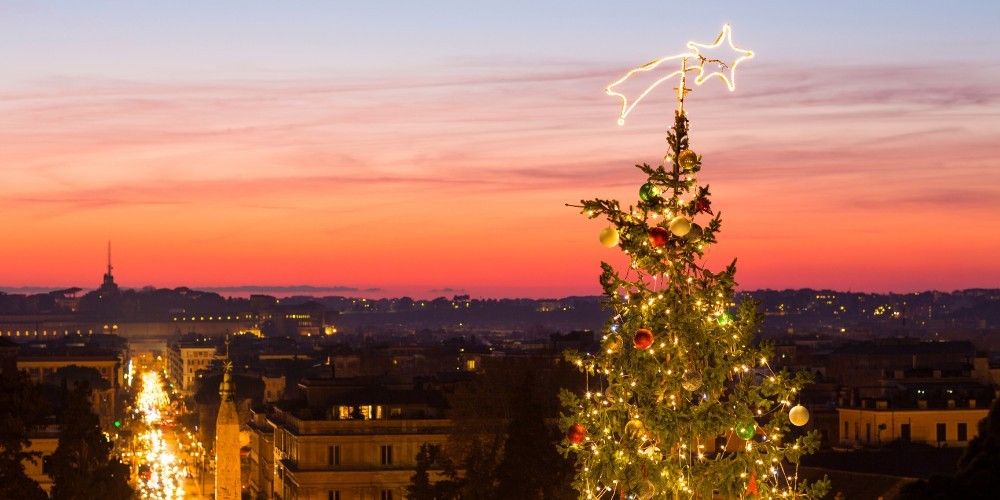
Although it is a religious holiday, 8th December is a national holiday in Italy. It is the perfect opportunity to visit Italy's main art cities to discover new exhibitions or wander around the traditional Christmas markets.
Public offices, banks and post offices are closed. All shops are open and it's the height of the Christmas decorations in shopping centres as well as on city street.
It is the ideal opportunity to indulge in a trip to typical Italian villages and breathe in the warm, family atmosphere of the Christmas season in front of a blazing fireplace in an Alpine hut.
Let's discover the traditions linked to the feast of the Immaculate Conception and how we celebrate the 8th of December in Italy!
What do people eat on the feast of Immaculate Conception?
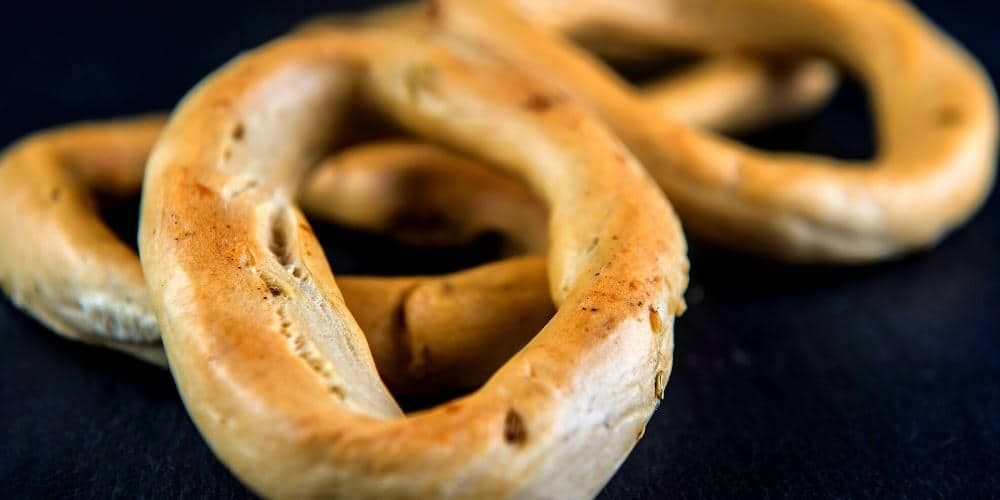
Taralli dell'Immacolata
The Feast of Immaculate Conception is the occasion for all Italians to get together for the first meal to share all and kick off the Christmas festivities. It involves large tables and "binges" in a company, with traditional dishes.
If you are in Basilicata, in Matera, on this day, you must try the famous Tarallo dell'Immacolata, also called pan di tarallo or "Ficcilatidd" in dialect.
"Ficcilatidd", from Latin "fiscus", meaning basket. This term indicates the basket in which loaves of bread were placed in the past. It is a ritual that has been handed down for centuries.
Even today, on 7 December, many families in Matera observe the "Vigil fast" and prepare for the feast on the following day.
For lunch on 8 December, children up to the age of eight and the elderly are excluded from this fast and appease their appetites with these biscuit-shaped taralli with fennel seeds, while adults eat it by dipping it in red wine.
This ritual is just a preparation for the Immaculate Conception dinner. There is a unique traditional menu that includes cod, the fish that was once considered less expensive, cooked in a stew or fried, preceded, today, by a portion of spaghetti with garlic, oil and chilli pepper. How to resist!
In Sardinia, particularly in the province of Oristano, you can taste "mustazzoleddus de mendula", small sweets typical of the Christmas period, made with almond flour and decorated with icing.
In the Sassari province, you can taste "Sa Cogonelda" sweet scones with ‘ciccioli (small balls made from pork fat), stuffed with sultanas, orange peel and star anise.
To learn more about the culinary traditions of Christmas in Italy, discover our guide to the most delicious Italian foods of the Christmas season.
December 8th in Puglia: the Bonfire of the Immaculate Conception
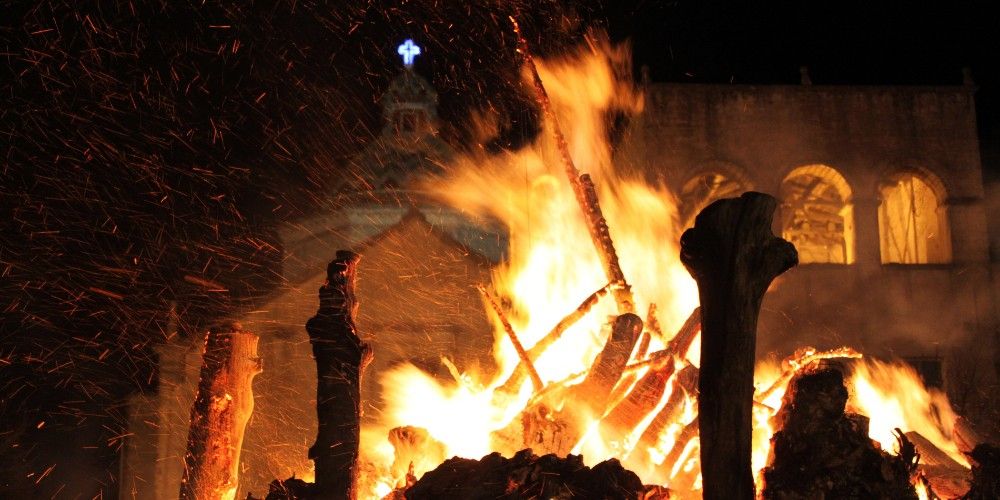
The Bonfire of the Immaculate Conception - Ph: Credit: Di Giandomobile - Opera propria, CC BY-SA 4.0
Beside the Living Nativity, Puglia has always guarded many solid traditions and rituals. The Feast of the Immaculate Conception is a much-awaited occasion, celebrated by lighting a huge bonfire, one of the oldest Puglia traditions involving young and old.
The fire, in this case, is not just a ritual but takes on different meanings. Some believe the Madonna used it to dry the clothes of the baby Jesus. On the other hand, others see fire as a symbol of the elimination of original sin, to be burnt as a propitiatory rite wishing fertility to the land.
On the night between 7 and 8 December, fires are lit all over Apulia in honour of the Immaculate Virgin. Referred to by various dialect expressions, such as "fanova" or "u fame", they are intended to purify.
The tradition of celebrating with fire is also kept alive in Abruzzo and Marche.
The typical Apulian food to taste around the fire
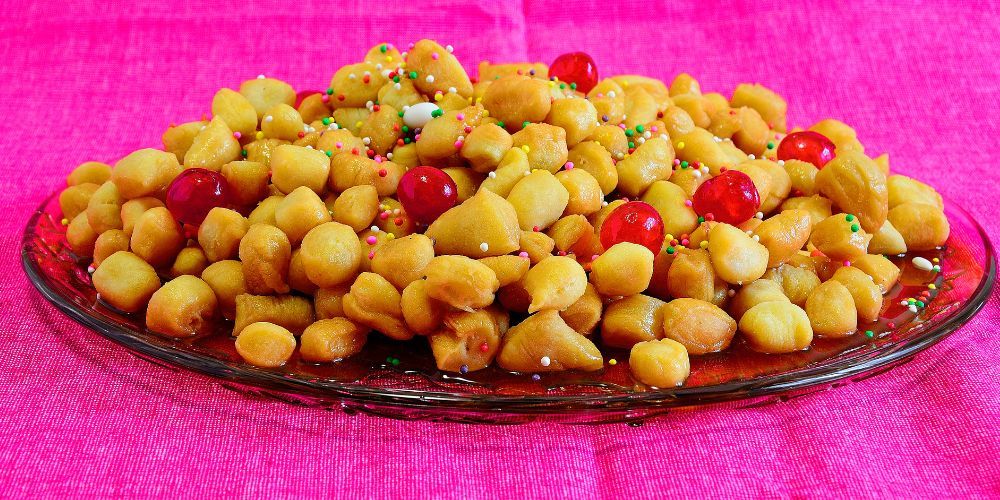
Fire has always meant family unity, the so-called "home hearth", so these large bonfires can only be traditionally accompanied by tastings of typical Apulian dishes and wines.
"Ti la mmaculata la prima ffrizzulata, ti la Cannilora l'ultima frizzola".
Every respecting Apulian family fries "pettole" or "pittule". They are cakes made of well-leavened bread dough, which in the past were cooked in the fireplace, traditionally filled with ricotta cheese, tuna, capers and tomato.
They are prepared on the feast of the Immaculate Conception and again on Candlemas, accompanied by an excellent vin cotto made by grapes or figs. A real treat for the palate!
Another delicacy is the typical Apulian "Puccia" on Immaculate Conception Day, a small bread roll filled with breadcrumbs and served with tuna and "Swiss" cheese.
Now all that's left to do is to go to the table in beautiful Puglia and enjoy "Baccalà in pignata con patate" and "grano cotto nel sugo" for a day of conviviality.
Feast of the Immaculate Conception in Campania: faith and art
The Feast of the Immaculate Conception is particularly popular in southern Italy, mainly because the Immaculate Conception was the patron saint of the Kingdom of the Two Sicilies.
Campania is deeply linked to the celebrations in honour of the Virgin Mary because it is said that at the end of the 19th century, a heavy storm broke out at sea in Naples.
A single man on his fishing boat saved himself by floating out to sea, clinging to a wooden log and praying to the Virgin Mary. Once he was safe, the man felt miraculous and told everyone that the Immaculate Conception had saved him.
Every year on 8 December, firefighters, civil and religious authorities pay homage to the Virgin Mary with a bundle of flowers carried to the Obelisk of the Immaculate Conception in Piazza del Gesù, an imposing monument of Marian devotion in the centre of the city.
Naples dresses up for the festivities, with lights and the traditional fairs of San Biagio dei Librai and San Gregorio Armeno (we spoke about those places also in our guide to the best Christmas markets in Campania)
Strolling through its streets is fantastic on this day. It is an opportunity to visit the beautiful open churches, listen to famous and Christmas music concerts, and participate in the many art and folklore initiatives in the different districts.
The "Rione Sanità", in particular, is even more atmospheric at this time of year, thanks to its decorations and illuminations.
Visit Naples with Naples Pass8th December and the sweet southern tradition: the “roccocò”
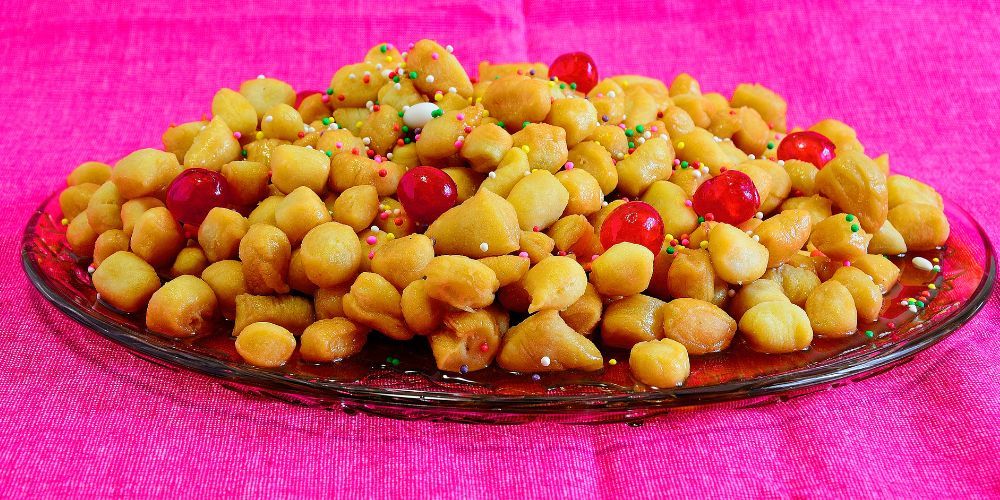
A sweet tradition has taken root on 8th December in Campania, whose protagonist is the "Roccocò" a milestone of Christmas culinary in Naples, together with struffoli.
This buscuit traditionally closes the Immacolata lunch of Neapolitan families. Typically baked and filled with almonds and spices, it has a unique flavour.
It was the nuns of the Real Convento Della Maddalena who, in 1320, came up with the recipe for this biscuit, which immediately became a typical Neapolitan Christmas cake.
Roccocò derives from the French "Rocaille" and refers to its shape, which resembles a rounded shell. It is a hard biscuit, so it should be soaked in vermouth or accompanied by a good Passito wine.
8 December in Sicily: Immaculate Conception processions
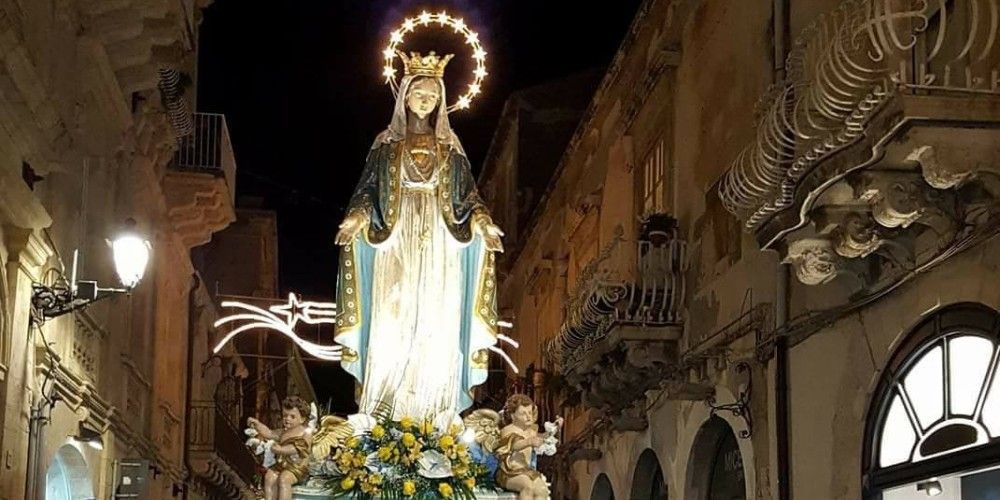
8 December in Syracuse: the procession of the Immaculate Conception - Ph. credit: Confraternita dell' Immacolata di Siracusa fbook page
In Sicily, numerous processions are dedicated to the Immaculate Conception and all towns are festively decorated for this important celebration.
At Altofonte in the province of Palermo, the celebration is organised by the Congregazione di Maria SS. Immacolata, a confraternity devoted to the Immaculata.
The celebrations begin at night with the "Mattutino" or "call of the Immaculate", a procession through the streets of the town in which all the confraternity members are called with songs and prayers to participate in the parade and to venerate the Immaculate.
During the procession, people drink tea and coffee and eat biscuits or other sweets prepared by the wives of the brethren.
The morning concludes in church with mass, and after the religious ceremony, "vastedde", typical flatbreads seasoned with oil and cheese or ricotta cheese, are eaten.
And to end the celebration....the fireworks!
In Termini Imerese, also in the province of Palermo, 8 December is one of the most important days of the year.
The Immaculate Conception is the patron saint of the city. For this reason the celebration is very heartfelt!
The day is marked by three processions that pass through the town with simulacra from the churches devoted to the Immaculate Conception.
The most important procession is the night one. This one attracts most citizens and faithful from neighbouring towns.
In Syracuse on the Ionian coast, the celebration of the Immaculate Conception begins on 29 November. At this time, the city is festive, and on 8 December, the brass band tours the city from the early morning.
The band calls the citizens to celebrate until the religious ceremony begins. Another parade is held during the day while the evening closes with fireworks.
Visit Palermo with the hop-on hop-off bus tourWhat to eat in Sicily on December 8th
In Sicily, too, there are typical products to taste on 8 December.
The typical product par excellence is the "Vastedda", a large focaccia dressed with salt, oil, pepper, caciocavallo or ricotta cheese.
In the province of Palermo, we can taste the "maffuletta", a loaf of wheat bread seasoned in various ways.
Those who love sweets can enjoy "Sfincette" dell'Immacolata, warm fritters of leavened dough covered with cinnamon and sugar, or "Petrafennula", a sweet made with almonds, honey, orange and citron peels, cinnamon and sugared almonds.
In Messina, in north-eastern Sicily, they make "Nipitidda", a puff pastry cake filled with walnuts, almonds, dried figs, chocolate and jam.
8th of December in Rome
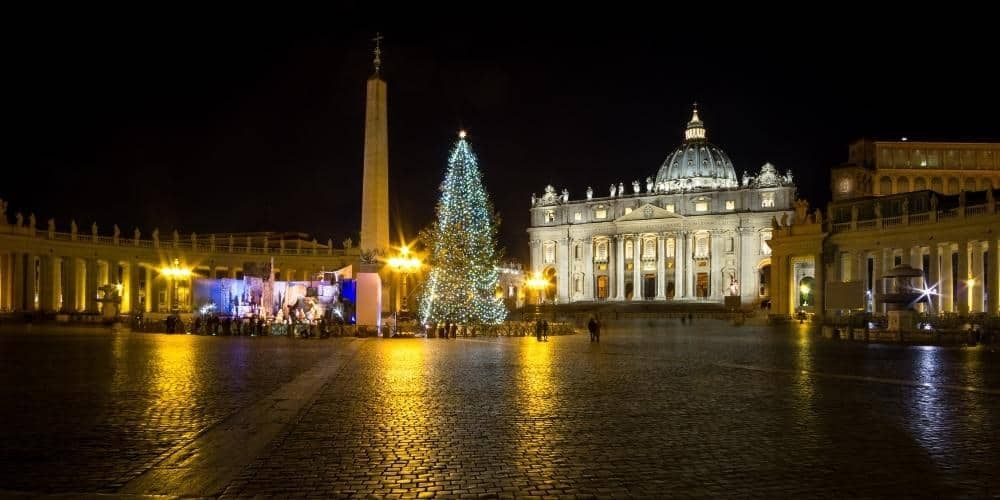
Christmas season in Rome: Saint Peter's square
If you are in Italy and want to dream of the Feast of the Immaculate Conception, there is no other destination than Rome, the Eternal City.
The capital is illuminated with lights, stars and, above all, trees. A magical combination of history and spirituality welcomes visitors in a unique Christmas atmosphere.
In Rome, 8 December is an essential and, above all, spiritual holiday. Traditionally, the most awaited moment was the veneration of the statue of the Virgin in Piazza Mignanelli at the presence of the Pope and authorities and the flood of believers.
Spending the feast of the Immaculate Conception in Rome is the perfect way to combine the sacredness of the occasion with culture and fun that can please young and old alike.
Preparations are in full swing in Piazza Venezia for the traditional lighting of the Christmas tree and illuminations in Via del Corso every year during this week. The Romans use to name each tree, such as "Spelacchio", the rather bare tree, or "Spoiler", the Netflix tree.
Also fascinating is the tree in Piazza San Pietro, a marvellous fir tree that will light up St Peter's and add charm to this eternally beautiful square during the festive season.
Next to the tree in St. Peter's Square is the famous nativity scene, with life-size statues from a different part of the world each year.
For romantics and in search of intimacy, the perfect thing is to stroll illuminated by lights of the Christmas tree next to the Colosseum in an unparalleled Christmas atmosphere. This is the perfect time to admire the beauty of the illuminated Eternal City, for a tour of the lights in Rome's most famous shopping streets.
These are just some of the traditions that each region of Italy holds for the Feast of Immaculate Conception.
All that remains is to experience them in person!
Visit Rome with Visit Rome passWhat to do on 8 December 2025: cultural events
8 December officially starts the Christmas season, and everywhere, large or small, preparations for Christmas are in full swing, and the atmosphere is lively!
From North to South, you will be spoilt for choice, including religious celebrations, markets, nativity scenes, and cultural events.
Mountain and ski lovers in Trentino Alto Adige will have a wide choice of activities, including markets, cribs, tastings of typical products and cultural visits.
We recommend the picturesque medieval town of Glorenza, in the province of Bolzano. Glorenza is the smallest town in South Tyrol and one of Italy's most beautiful hamlets.
The "Advent of Glorenza" takes place from 6 to 8 December. It is a cultural event that includes traditional markets, music, theatre, and activities for children.
In this medieval village's unique and suggestive atmosphere, there will be musical moments with brass bands and choirs, as well as many artisans with their handicrafts.
In Milan, you cannot miss the traditional "Oh Bej, Oh Bej" fair, which takes place on 7 and 8 December. The event brings local handicraft stalls, flavours and a unique atmosphere to the centre of Milan
This year, the fair will occur from 5 to 8 December in the city centre, near the Castello Sforzesco and the Parco Sempione.
The ‘Oh Bej, Oh Bej’ fair is free of charge and easily accessible by underground (Cairoli stop).
Visit Milan with Milan City PassCenter Italy’s event not to be missed
Those travelling to central Italy, in particular to Umbria, in the province of Perugia, cannot miss the famous Christmas tree in Gubbio.
Every year, on 7 December, the largest Christmas tree in the world is lit on the slopes of Monte Ingino, behind the beautiful medieval town of Gubbio.
Since 1981, this tree, made of a network of over 7,500 metres of cables and hundreds of coloured lights, has illuminated the mountain, spreading a magical Christmas atmosphere.
The Gubbio Christmas tree is about 750 metres high and covers the area of almost 30 football fields.
It is an extraordinary work of illumination and a symbol of brotherhood and unity. The magic of this special tree comes about thanks to the commitment and passion of the volunteers who, every year, set up this marvellous spectacle that arouses emotions of amazement and wonder.
An evocative southern tradition
Finally, on 7-8 December, the suggestive living nativity scene GRAVINAE NATIVITAS will take place in Gravina di Puglia in the province of Bari.
The historical centre of Gravina becomes the evocative setting where 150 costumed figures will re-enact the birth of the Baby Jesus.
Along the route, visitors will admire scenes of ancient trades and characters symbolising the Nativity, including merchants, artisans, peasants, and common people.
The Living Crib is a great cultural event that enhances Gravina's trades and traditions and the town's historical, cultural, and artistic landscape.
The event is free of charge.
What is celebrated on 8 December in Italy?
The Immaculate Conception is celebrated in Italy on 8 December. This religious festivity, linked to the Virgin Mary, establishes that Mary was without original sin from her conception. The state officially recognises this feast day, so public offices and schools are closed.
What happens in Rome on 8 December?
In Rome on 8 December, Roman citizens and authorities pay their respects to the statue of the Immaculate Conception in Piazza Mignanelli, near the famous Piazza Di Spagna. According to tradition, the first to pay their respects to the Virgin Mary are the firefighters, who place a garland of flowers on the Virgin's arm. The Pope also participates in the event. In addition, on this day, the Christmas tree in Piazza del Popolo is lit and markets, fairs and events occur throughout the centre.
Is 7 December a holiday in Italy?
7 December is a holiday in Italy only in Milan because it celebrates Saint Ambrose, the city's patron saint. On this day, public offices and many businesses are closed. On this occasion, the Milanese have two days off (7 and 8 December), and in the city, preparations for the Christmas season begin. Shops are open, and many Christmas events take place, first of all the traditional ‘Oh Bej, Oh Bej’ fair in the streets of the centre.
Why is 8 December important in Italy?
8th December is an important religious holiday linked to Mary. It opens the Christmas season and the preparations for Christmas. Religious celebrations and evocative processions dedicated to the Virgin Mary occur nationwide. Families put up Christmas trees, cities are lit up, people start Christmas shopping, and events and festivities dedicated to Christmas begin all over the country.
What do Italians eat on Immaculate Conception Day?
Immaculate Conception Day is a public holiday; families often get lunch together. This is why the menu is full of tasty first courses ranging from pasta with meat sauce to lasagne, and second courses of meat or fish. From North to South, there are many typical dishes and Christmas desserts.
About the author
Written on 07/12/2021

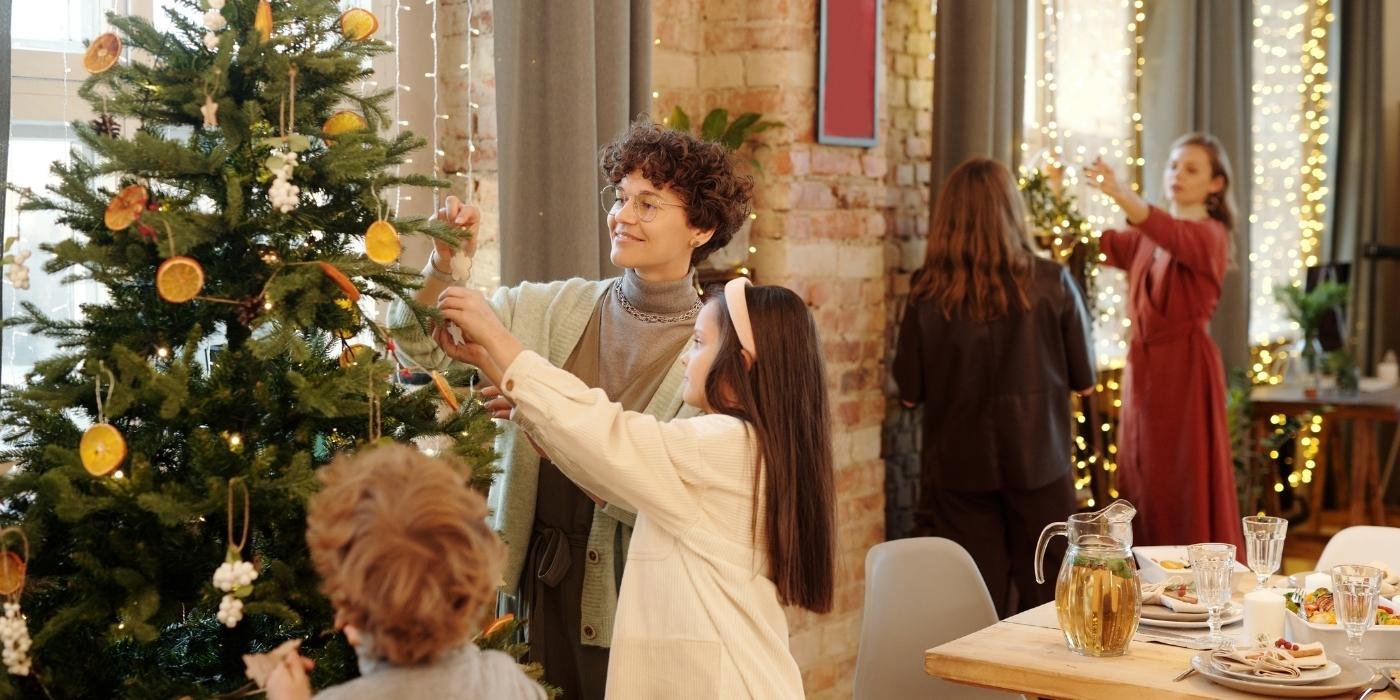
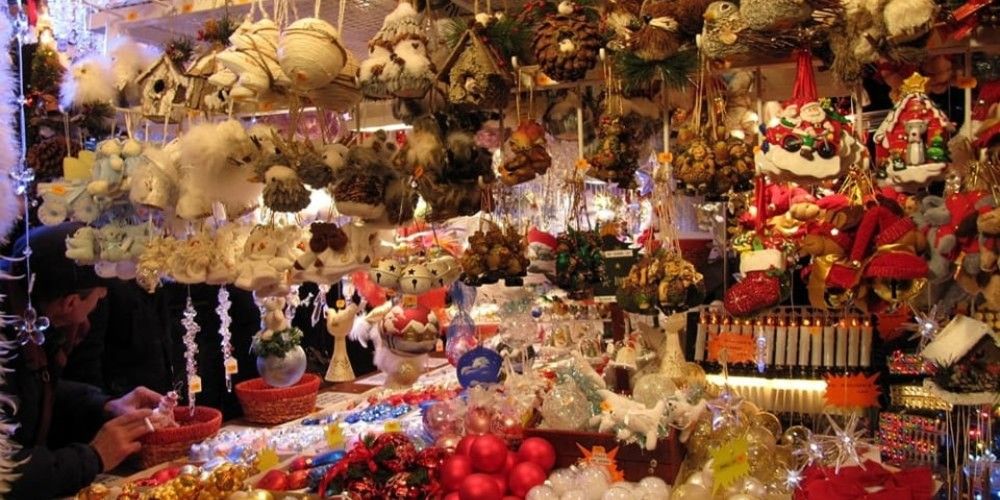

Ilaria Capatti
In Italy the Christmas season begins with the Feast of the Immaculate Conception. Let's discover the Italian traditions of December 8th!